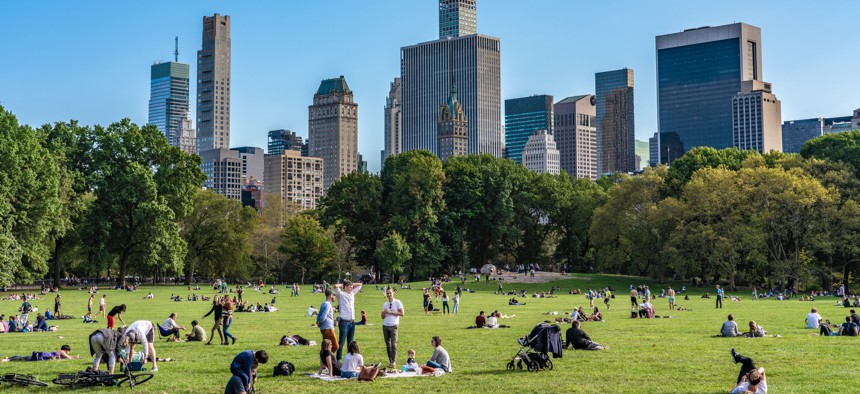Interacting With Nature in Cities Can Reduce Loneliness

View of Sheep Meadow in Central Park and the midtown Manhattan city skyline on October 12, 2019 in New York iStock.com/stockinasia
Local officials should improve access to existing green spaces, among other things, to help lessen loneliness, one study shows.
Loneliness is a significant mental health concern that affects a large proportion of society, with adults under 25 years old and older than 65 feeling the loneliest, according to a study in Scientific Reports. However, the study shows that contact with nature in cities can significantly reduce feelings of loneliness by enhancing feelings of attachment to a place or by providing more opportunity to socialize.
The term loneliness is often associated with reduced social presence and social isolation. According to the study, people can experience different levels of loneliness throughout the day depending on their environment.
The report also shows that feelings of overcrowding increased loneliness by 39%. However, when people heard birds chirping, looked at trees or the sky, the feelings of loneliness fell by 28%, according to The Guardian, which reported on the study.
Feelings of social inclusion also cut loneliness by 21%, and when those feelings overlapped with contact with nature, the beneficial effect was boosted by 18%, the study shows.
3 Key Findings
Here are key points governments can consider, according to the research:
- Loneliness provides indirect support to the idea of “social prescribing.” Social prescribing is engaging with social activities to improve health, which might be important for vulnerable populations like elderly people, those with reduced mobility and people with mental health issues.
- Loneliness can change based on the environment, so it is vital to focus on nature in new residential areas while also improving green space access in existing ones.
- More research is required to explore what counteracts the adverse effects of increased population density.
According to the journal article, the university researchers collected data from people living in urban areas across the world using the Urban Mind research app, which measures a person's experience living in an urban or rural place.
People were prompted three random times a day for a fortnight, during waking hours, to answer simple questions on loneliness, overcrowding, social inclusion and contact with nature, according to The Guardian article. More than 750 people provided 16,600 of these assessments, which included the questions “do you feel welcome among [the people around you]?” and “can you see trees right now?”
For more information from the research click here.
Andre Claudio is an assistant editor at Route Fifty.
NEXT STORY: Stop Fetishizing Old Homes





